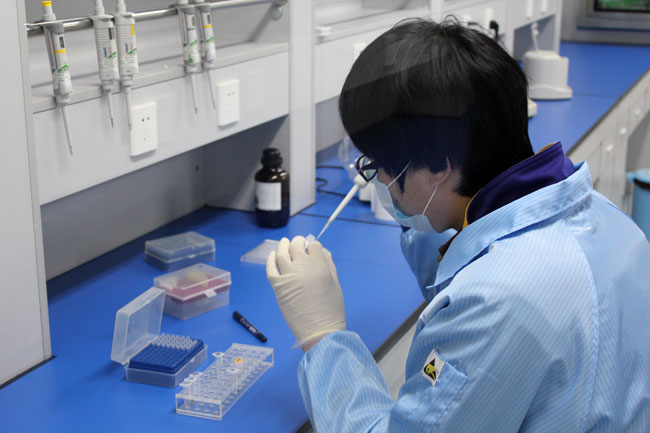|
 |
|
A member of staff conducts a DNA test at the Zhongzheng Forensic Authentication Institute in Beijing.WANG ZHUANGFEI/ FOR CHINA DAILY |
|
Blood is thicker than water Records from the Song Dynasty (960-1279) show that a common test for discerning close blood relationships was the mixing of drops of blood from both parents and their baby in a bowl of water. If the blood blended, the relationship was confirmed, while separation indicated no relationship. "That method is neither scientific nor reliable, but modern gene technology gives an accurate answer to questions of blood ties," said Deng Yajun, a DNA test expert at the Zhongzheng Forensic Authentication Institute in Beijing. Generally speaking, the test has five main phases: registration; taking samples; magnifying the samples; introducing the samples into the testing kit; and finally, the test itself, conducted via machine. Samples must be taken in a clean environment. Contamination from dust and other non-biological matter won't influence the result, but the testing staff is rigorously covered up to prevent their hair, scurf or saliva from entering the mix. Blood relationships between animals can also be identified through DNA tests, and Deng said her institute has received several requests for tests from courts looking to establish the ownership or provenance of an animal. "Most are disputes between villagers about the ownership of a calf or a foal. The kits for animal tests are more expensive than those for humans, but people are willing to pay to maintain their reputations," she said. - Yang Wanli |
Some experts attribute the growth of DNA paternity testing to traditional ideas that demand chastity and total loyalty from women. Given the restrictions imposed by the family planning policy, an illegitimate child might prove financially disastrous for the parents.
"The rising number of people taking DNA paternity tests indicates that the status of women and their rights in China are still confined to bearing children," said Yang Dawen, a professor of marital law at Renmin University of China who is also deputy director of the China Research Center for Marriage and the Family.
"Personally speaking, I think parents should try to love the kid, even if it's been proved that there are no blood ties, because the child already has an emotional connection with the family," he said. "But if the husband or the wife can't accept the result, or in some cases, refuses the test, their decision should also be respected."
Yang pointed out that the child might be emotionally damaged by the testing process. "We should think more about the potential harm to the child," he said.
Blood brothers
DNA technology doesn't just prove blood links with parents, but can also give a reliable judgment on other genetic relationships, such those between brothers, sisters and cousins. However, in "genetic relationships" tests, the lower the number of comparable samples provided, the greater the cost. For example, if a woman and a man to want know whether they are brother and sister but they don't have samples from their parents, the test will cost more than 10,000 yuan.
This booming market has naturally attracted some illegal operators. In December, a man in Zhejiang province sued an illegal DNA testing center because it gave him the wrong result, which denied the blood link between him and his son. After taking a test at an authorized center, it was proved that original result had been inaccurate.
Generally speaking, paternity testing falls into two categories - those for civil purposes and those for criminal investigations. Testing centers are commonly authorized by local judicial departments, or are registered with the local commerce department and supervised by the health department.
During the testing process, the DNA in the samples is magnified several million times to make it big enough to reveal hereditary information. By comparing samples, the result can be determined, based on certain hereditary principles.
As a committee member of the Beijing Forensic Medicine Association, Deng has visited other testing centers to help them improve their accuracy rates. She said very few centers still use imported kits that only have 15 loci (the specific location of a gene or DNA sequence on a chromosome). "Because of the large population in China, 15 loci are not enough to recognize some of the distinctions," Deng said.
Since 2010, some Chinese companies have developed testing kits with 20 to 40 loci, which have greatly improved the accuracy rate. Many of the illegal institutes, however, still use 15-loci kits.
Interpreting the result is also of critical importance. Deng said it's inevitable that some abnormal data will emerge, which provides a challenge to the readers looking to prove or disprove a blood relationship. Sometimes, the abnormal data is the result of the concentration rate of the samples. "To make the correct decision and provide a responsible result depends on experience. That's why we urge people not to turn to the illegal institutes just because they are cheaper," she said.
Some customers will even undertake several tests if the results aren't to their liking. "Actually, if the result turns to be a non-blood tie, we will usually retest the sample twice or even three times because we realize that such a result will be difficult for most families to handle," Deng said. "But still, there's no other answer; there's only one true result in a DNA test."
Contact the author at: yangwanli@chinadaily.com.cn
